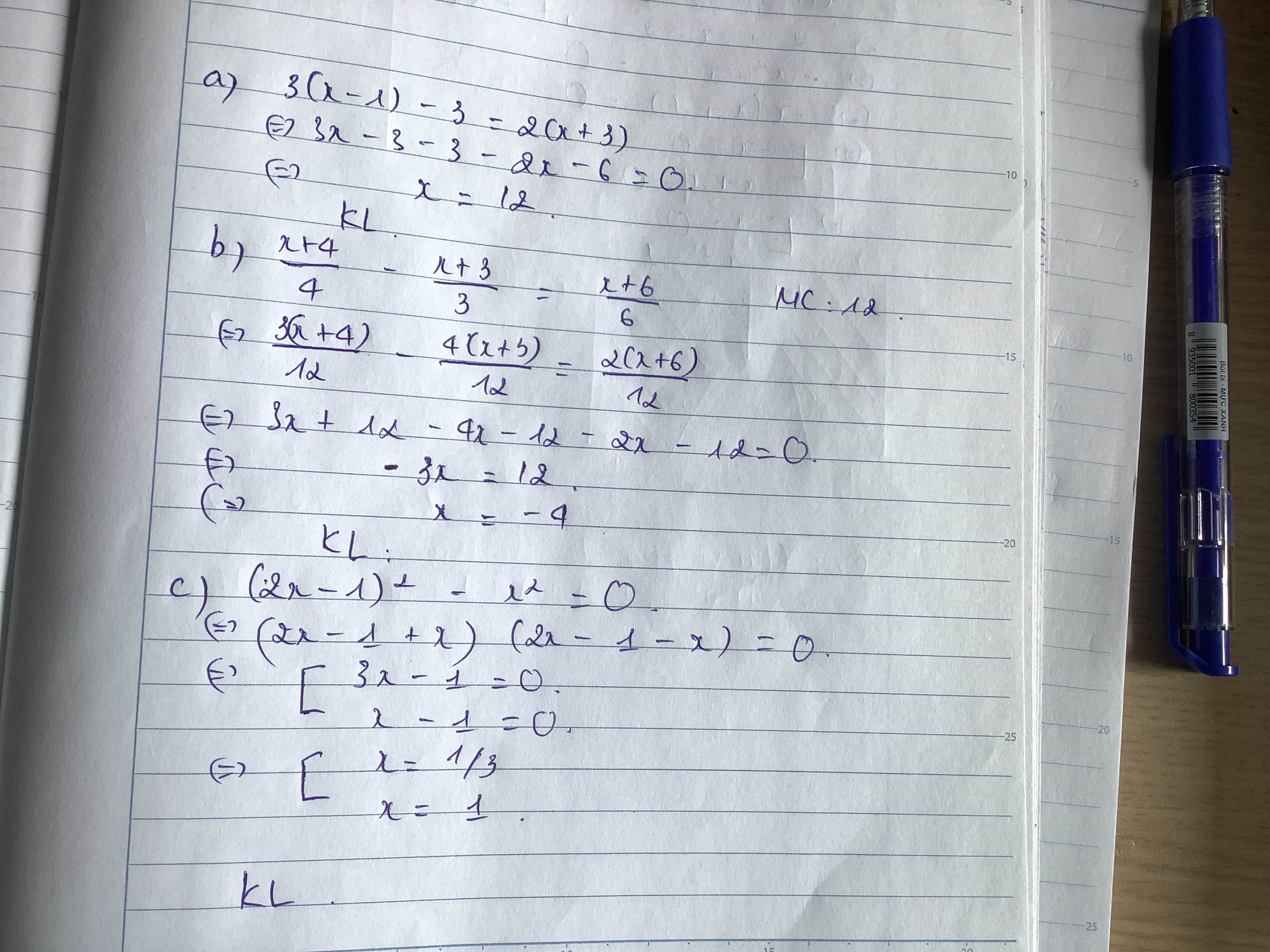Giải phương trình: \(A=\dfrac{1}{x^2-2x+2}+\dfrac{2}{x^2-2x+3}=\dfrac{6}{x^2-2x+4}\)
H24
Những câu hỏi liên quan
Giải các phương trình sau:
a) \(\dfrac{1}{x^2-2x+2}\) + \(\dfrac{2}{x^2-2x+3}\) = \(\dfrac{6}{x^2-2x+4}\)
b) \(\dfrac{x^2+2x+7}{\left(x+1\right)^2+2}\) = x2 + 2x + 4
b) Đặt \(x^2+2x+3=a\)(a>0)
Ta có: \(\dfrac{x^2+2x+7}{\left(x+1\right)^2+2}=x^2+2x+4\)
\(\Leftrightarrow\dfrac{x^2+2x+7}{x^2+2x+1+2}=x^2+2x+4\)
\(\Leftrightarrow\dfrac{x^2+2x+7}{x^2+2x+3}=x^2+2x+4\)
\(\Leftrightarrow\dfrac{a+4}{a}=a+1\)
\(\Leftrightarrow a^2+a=a+4\)
\(\Leftrightarrow a^2=4\)
\(\Leftrightarrow\left[{}\begin{matrix}a=2\left(nhận\right)\\a=-2\left(loại\right)\end{matrix}\right.\)
\(\Leftrightarrow x^2+2x+3=2\)
\(\Leftrightarrow x^2+2x+1=0\)
\(\Leftrightarrow\left(x+1\right)^2=0\)
\(\Leftrightarrow x+1=0\)
hay x=-1
Vậy: S={-1}
Đúng 2
Bình luận (1)
ĐKXĐ của cả 2 pt trên đều là `x in RR`
`a,1/(x^2-2x+2)+2/(x^2-2x+3)=6/(x^2-2x+4)`
Đặt `a=x^+2x+3(a>=2)` ta có:
`1/(a-1)+2/a=6/(a+1)`
`<=>a(a+1)+2(a-1)(a+1)=6a(a-1)`
`<=>a^2+a+2(a^2-1)=6a^2-6a`
`<=>a^2+a+2a^2-2=6a^2-6a`
`<=>3a^2-5a+2=0`
`<=>3a^2-3a-2a+2=0`
`<=>3a(a-1)-2(a-1)=0`
`<=>(a-1)(3a-2)=0`
`a>=2=>a-1>=1>0`
`a>=2=>3a-2>=4>0`
Vậy pt vô nghiệm
`(x^2+2x+7)/((x+1)^2+2)=x^2+2x+4`
`<=>(x^2+2x+7)=(x^2+2x+4)(x^2+2x+3)`
Đặt `a=x^2+2x+3(a>=2)`
`pt<=>a+4=a(a+1)`
`<=>a^2+a=a+4`
`<=>a^2=4`
`<=>a=2` do `a>=2`
`<=>(x+1)^2+2=2`
`<=>(x+1)^2=0`
`<=>x=-1`
Vậy `S={-1}`
Đúng 3
Bình luận (0)
bài 4 giải các phương trình saub,dfrac{x+2}{3}-dfrac{3}{4}dfrac{x-1}{3}d,dfrac{x-2}{4}+dfrac{x+1}{6}dfrac{2x}{3}f,dfrac{x+2}{4}+dfrac{2x-3}{3}dfrac{x-12}{6}h,dfrac{10x+3}{12}1+dfrac{6+8x}{9}j,dfrac{2x-1}{5}-dfrac{x-2}{3}dfrac{x+7}{15}m,dfrac{2+x}{5}-0,5xdfrac{1-2x}{4}+0,25
Đọc tiếp
bài 4 giải các phương trình sau
b,\(\dfrac{x+2}{3}-\dfrac{3}{4}=\dfrac{x-1}{3}\)
d,\(\dfrac{x-2}{4}+\dfrac{x+1}{6}=\dfrac{2x}{3}\)
f,\(\dfrac{x+2}{4}+\dfrac{2x-3}{3}=\dfrac{x-12}{6}\)
h,\(\dfrac{10x+3}{12}=1+\dfrac{6+8x}{9}\)
j,\(\dfrac{2x-1}{5}-\dfrac{x-2}{3}=\dfrac{x+7}{15}\)
m,\(\dfrac{2+x}{5}-0,5x=\dfrac{1-2x}{4}+0,25\)
k,\(\dfrac{x}{3}-\dfrac{2x+1}{2}=\dfrac{x}{6}-x\)
giúp mk câu k nhé đề bài như trên
Đúng 0
Bình luận (0)
b: \(\Leftrightarrow4x+8-9=4x-4\)
=>-1=-4(loại)
d: \(\Leftrightarrow3\left(x-2\right)+2\left(x+1\right)=8x\)
=>8x=3x-6+2x+2=5x-4
=>3x=-4
=>x=-4/3
f: \(\Leftrightarrow3\left(x+2\right)+4\left(2x-3\right)=2\left(x-12\right)\)
=>3x+6+8x-12=2x-24
=>11x-6=2x-24
=>9x=-18
=>x=-2
Đúng 1
Bình luận (0)
Giải phương trình :a,\(\dfrac{2x 1}{6}-\dfrac{x-2}{4}=\dfrac{3-2x}{3}-x\)b,\(\dfrac{3\left(2x 1\right)}{4}-5-\dfrac{3x 2}{10}=\dfrac{2\left(3x-1\right)}{5}\)\(c,\dfrac{x 1}{2009} \dfrac{x 3}{2007}=\dfrac{x 5}{2005} \dfrac{x 7}{2003}\)\(d,\dfrac{392-x...
Xem chi tiết
a) Ta có: \(\dfrac{2x+1}{6}-\dfrac{x-2}{4}=\dfrac{3-2x}{3}-x\)
\(\Leftrightarrow\dfrac{2\left(2x+1\right)}{12}-\dfrac{3\left(x-2\right)}{12}=\dfrac{4\left(3-2x\right)}{12}-\dfrac{12x}{12}\)
\(\Leftrightarrow4x+2-3x+6=12-8x-12x\)
\(\Leftrightarrow x+8-12+20x=0\)
\(\Leftrightarrow21x-4=0\)
\(\Leftrightarrow21x=4\)
\(\Leftrightarrow x=\dfrac{4}{21}\)
Vậy: \(S=\left\{\dfrac{4}{21}\right\}\)
Đúng 2
Bình luận (0)
Hình như em viết công thức bị lỗi rồi. Em cần chỉnh sửa lại để được hỗ trợ tốt hơn!
Đúng 1
Bình luận (2)
a)
PT \(\Leftrightarrow \frac{4x+2}{12}-\frac{3x-6}{12}=\frac{12-8x}{12}-\frac{12x}{12}\)
\(\Leftrightarrow 4x+2-3x+6=12-8x-12x\)
\(\Leftrightarrow 21x=4\Leftrightarrow x=\frac{4}{21}\)
b)
PT \(\Leftrightarrow \frac{30x+15}{20}-\frac{100}{20}-\frac{6x+4}{20}=\frac{24x-12}{20}\)
\(\Leftrightarrow 30x+15-100-6x-4=24x-12\Leftrightarrow -89=-12\) (vô lý)
Vậy pt vô nghiệm.
Đúng 1
Bình luận (4)
Xem thêm câu trả lời
giải các phương trình sau
a, 3(x-1) -3=2(x+3)
b, \(\dfrac{x+4}{4}-\dfrac{x+3}{3}=\dfrac{x+6}{6}\)
c,\(\left(2x-1\right)^2-x^2=0\)
d,\(\dfrac{x}{x+3}-\dfrac{2x}{x-3}-\dfrac{3x}{9-x^2}=0\)
d: Ta có: \(\dfrac{x}{x+3}-\dfrac{2x}{x-3}-\dfrac{3x}{9-x^2}=0\)
\(\Leftrightarrow x^2-3x-2x^2-6x+3x=0\)
\(\Leftrightarrow-x^2-6x=0\)
\(\Leftrightarrow-x\left(x+6\right)=0\)
\(\Leftrightarrow\left[{}\begin{matrix}x=0\left(nhận\right)\\x=-6\left(nhận\right)\end{matrix}\right.\)
Đúng 1
Bình luận (0)
a: Ta có: \(3\left(x-1\right)-3=2\left(x+3\right)\)
\(\Leftrightarrow3x-3-3=2x+6\)
\(\Leftrightarrow x=12\)
b: Ta có: \(\dfrac{x+4}{4}-\dfrac{x+3}{3}=\dfrac{x+6}{6}\)
\(\Leftrightarrow3x+12-4x-12=2x+12\)
\(\Leftrightarrow-3x=12\)
hay x=-4
c: Ta có: \(\left(2x-1\right)^2-x^2=0\)
\(\Leftrightarrow\left(x-1\right)\left(3x-1\right)=0\)
\(\Leftrightarrow\left[{}\begin{matrix}x=1\\x=\dfrac{1}{3}\end{matrix}\right.\)
Đúng 0
Bình luận (0)
Giải các bất phương trình sau rồi biểu diễn tập nghiệm của chúng trên trục số:1) left(x+3right)^2-3left(2x-1right)xleft(x-4right)2) 1+dfrac{x+1}{3}dfrac{2x-1}{6}-23) x-dfrac{2x-7}{4} dfrac{2x}{3}-dfrac{2x+3}{2}-14) dfrac{2x+1}{x-3}le25) dfrac{12-3x}{2x+6}36) x^2+3x-4le07) dfrac{5}{5x-1} dfrac{-3}{5-3x}8) left(2x-1right)left(3-2xright)left(1-xright)0
Đọc tiếp
Giải các bất phương trình sau rồi biểu diễn tập nghiệm của chúng trên trục số:
1) \(\left(x+3\right)^2-3\left(2x-1\right)>x\left(x-4\right)\)
2) \(1+\dfrac{x+1}{3}>\dfrac{2x-1}{6}-2\)
3) \(x-\dfrac{2x-7}{4}< \dfrac{2x}{3}-\dfrac{2x+3}{2}-1\)
4) \(\dfrac{2x+1}{x-3}\le2\)
5) \(\dfrac{12-3x}{2x+6}>3\)
6) \(x^2+3x-4\le0\)
7) \(\dfrac{5}{5x-1}< \dfrac{-3}{5-3x}\)
8) \(\left(2x-1\right)\left(3-2x\right)\left(1-x\right)>0\)
1: \(\Leftrightarrow x^2+6x+9-6x+3>x^2-4x\)
=>-4x<12
hay x>-3
2: \(\Leftrightarrow6+2x+2>2x-1-12\)
=>8>-13(đúng)
4: \(\dfrac{2x+1}{x-3}\le2\)
\(\Leftrightarrow\dfrac{2x+1-2x+6}{x-3}< =0\)
=>x-3<0
hay x<3
6: =>(x+4)(x-1)<=0
=>-4<=x<=1
Đúng 1
Bình luận (0)
Giải các phương trình sau: (TM ĐK) 1) dfrac{11}{x}dfrac{9}{x+1}+dfrac{2}{x-4} 2) dfrac{14}{3x-12}-dfrac{2+x}{x-4}dfrac{3}{8-2x}-dfrac{5}{6} 3) dfrac{x+5}{x^2-5x}-dfrac{x+25}{2x^2-50}dfrac{x-5}{2x^2+10} 4) dfrac{x+1}{x-1}-dfrac{x-1}{x+1}dfrac{16}{x^2-1} 5) left(1-dfrac{x-1}{x+1}right)left(x+2right)dfrac{x+1}{x-1}+dfrac{x-1}{x+1} mng giúp mk bài này nha. Cảm ơn bạn nhiều
Đọc tiếp
Giải các phương trình sau: (TM ĐK)
1) \(\dfrac{11}{x}=\dfrac{9}{x+1}+\dfrac{2}{x-4}\)
2) \(\dfrac{14}{3x-12}-\dfrac{2+x}{x-4}=\dfrac{3}{8-2x}-\dfrac{5}{6}\)
3) \(\dfrac{x+5}{x^2-5x}-\dfrac{x+25}{2x^2-50}=\dfrac{x-5}{2x^2+10}\)
4) \(\dfrac{x+1}{x-1}-\dfrac{x-1}{x+1}=\dfrac{16}{x^2-1}\)
5) \(\left(1-\dfrac{x-1}{x+1}\right)\left(x+2\right)=\dfrac{x+1}{x-1}+\dfrac{x-1}{x+1}\)
mng giúp mk bài này nha. Cảm ơn bạn nhiều
\(1,\left(dk:x\ne0,-1,4\right)\)
\(\Leftrightarrow\dfrac{9}{x+1}+\dfrac{2}{x-4}-\dfrac{11}{x}=0\)
\(\Leftrightarrow\dfrac{9x\left(x-4\right)+2x\left(x+1\right)-11\left(x+1\right)\left(x-4\right)}{x\left(x+1\right)\left(x-4\right)}=0\)
\(\Leftrightarrow9x^2-36x+2x^2+2x-11x^2+44x-11x+44=0\)
\(\Leftrightarrow-x=-44\)
\(\Leftrightarrow x=44\left(tm\right)\)
\(2,\left(đk:x\ne4\right)\)
\(\Leftrightarrow\dfrac{14}{3\left(x-4\right)}-\dfrac{2+x}{x-4}-\dfrac{3}{2\left(x-4\right)}+\dfrac{5}{6}=0\)
\(\Leftrightarrow\dfrac{14.2-6\left(2+x\right)-3.3+5\left(x-4\right)}{6\left(x-4\right)}=0\)
\(\Leftrightarrow28-12-6x-9+5x-20=0\)
\(\Leftrightarrow-x=13\)
\(\Leftrightarrow x=-13\left(tm\right)\)
Đúng 2
Bình luận (2)
a\(8\left(x+\dfrac{1}{x}\right)^{2^{ }}+4\left(x^{2^{ }}+\dfrac{1}{x^2}\right)-4\left(x^2+\dfrac{1}{x^2}\right)\left(x+\dfrac{1}{x}\right)=\left(x+4\right)^2\)giải các phương trình\(\dfrac{x+4}{2x^2-5x+2}+\dfrac{x+1}{2x^2-7x+3}=\dfrac{2x+5}{2x^2-7x+3}\)
b)
ĐKXĐ: \(x\notin\left\{2;3;\dfrac{1}{2}\right\}\)
Ta có: \(\dfrac{x+4}{2x^2-5x+2}+\dfrac{x+1}{2x^2-7x+3}=\dfrac{2x+5}{2x^2-7x+3}\)
\(\Leftrightarrow\dfrac{x+4}{\left(x-2\right)\left(2x-1\right)}+\dfrac{x+1}{\left(x-3\right)\left(2x-1\right)}=\dfrac{2x+5}{\left(2x-1\right)\left(x-3\right)}\)
\(\Leftrightarrow\dfrac{\left(x+4\right)\left(x-3\right)}{\left(x-2\right)\left(2x-1\right)\left(x-3\right)}+\dfrac{\left(x+1\right)\left(x-2\right)}{\left(x-2\right)\left(x-3\right)\left(2x-1\right)}=\dfrac{\left(2x+5\right)\left(x-2\right)}{\left(2x-1\right)\left(x-3\right)\left(x-2\right)}\)
Suy ra: \(x^2-3x+4x-12+x^2-2x+x-2=2x^2-4x+5x-10\)
\(\Leftrightarrow2x^2-14=2x^2+x-10\)
\(\Leftrightarrow2x^2-14-2x^2-x+10=0\)
\(\Leftrightarrow-x-4=0\)
\(\Leftrightarrow-x=4\)
hay x=-4(nhận)
Vậy: S={-4}
Đúng 1
Bình luận (0)
giải phương trình sau
a, 6-4x=5(x+3)+3
b, \(\dfrac{x+3}{2}-1=\dfrac{x-1}{3}+\dfrac{x+5}{6}\)
c, (x-2)(2x+1) -3 (x-2) =0
d, \(\dfrac{2}{x^2-2x}+\dfrac{1}{x}=\dfrac{x+2}{x-2}\)
a: Ta có: \(6-4x=5(x+3)+3\)
\(\Leftrightarrow6-4x-5x-12-3=0\)
\(\Leftrightarrow-9x=9\)
hay x=-1
b: Ta có: \(\dfrac{x+3}{2}-1=\dfrac{x-1}{3}+\dfrac{x+5}{6}\)
\(\Leftrightarrow15x+45-30=10x-30+5x+25\)
\(\Leftrightarrow15=-5\left(loại\right)\)
c: Ta có: \(\left(x-2\right)\left(2x+1\right)-3\left(x-2\right)=0\)
\(\Leftrightarrow2\left(x-2\right)\left(x-1\right)=0\)
\(\Leftrightarrow\left[{}\begin{matrix}x=2\\x=1\end{matrix}\right.\)
Đúng 2
Bình luận (0)
d: Ta có: \(\dfrac{2}{x^2-2x}+\dfrac{1}{x}=\dfrac{x+2}{x-2}\)
\(\Leftrightarrow2+x-2=x^2+2x\)
\(\Leftrightarrow x^2+x=0\)
\(\Leftrightarrow x\left(x+1\right)=0\)
\(\Leftrightarrow\left[{}\begin{matrix}x=0\left(loại\right)\\x=-1\left(nhận\right)\end{matrix}\right.\)
Đúng 0
Bình luận (0)
giải phương trình 1)dfrac{1-6x}{x-2}+dfrac{9x+4}{x+2}dfrac{xleft(3x-2right)+1}{x^2-4}2) dfrac{3x+2}{3x-2}-dfrac{6}{2+3x}dfrac{9x^2}{9x^2-4}3) dfrac{x+5}{3x-6}-dfrac{1}{2}dfrac{2x-3}{2x-4}4) dfrac{x-1}{x}+dfrac{1}{x+1}dfrac{2x-1}{2x^2+2}5) dfrac{2}{x+1}+dfrac{3x+1}{x+1}dfrac{1}{left(x+1right)left(x-2right)}
Đọc tiếp
giải phương trình 1)\(\dfrac{1-6x}{x-2}+\dfrac{9x+4}{x+2}=\dfrac{x\left(3x-2\right)+1}{x^2-4}\)2) \(\dfrac{3x+2}{3x-2}-\dfrac{6}{2+3x}=\dfrac{9x^2}{9x^2-4}\)3) \(\dfrac{x+5}{3x-6}-\dfrac{1}{2}=\dfrac{2x-3}{2x-4}\)4) \(\dfrac{x-1}{x}+\dfrac{1}{x+1}=\dfrac{2x-1}{2x^2+2}\)5) \(\dfrac{2}{x+1}+\dfrac{3x+1}{x+1}=\dfrac{1}{\left(x+1\right)\left(x-2\right)}\)
giúp mình với ạ câu nào cũng được
Đúng 0
Bình luận (0)





